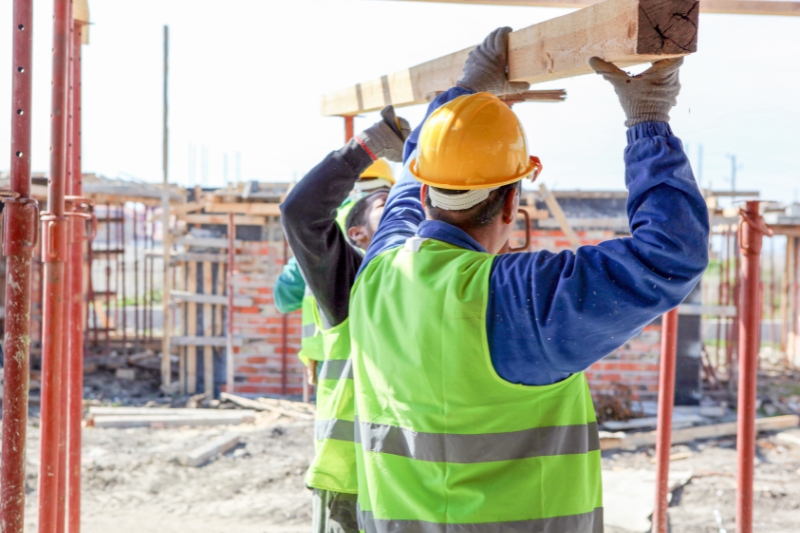As a job seeker, you might be searching for new career paths, like civil construction. You need answers to questions like what the civil field encompasses and how much it pays. Learn more about the types of work in this sector and the different ways to become a civil construction worker.
What Does Civil Construction Entail?

Civil construction often goes under the name civil engineering because of its focus on engineering infrastructure projects.
A civil contractor works to design physically built environments and maintain the integrity of natural and existing environments for civil projects.
You’re in the right place to learn more about this type of work and what positions might help build a viable and beneficial career path for your future.
What Is Civil Construction in Australia?
Civil construction work typically looks the same throughout Australia. Civil contractors will commonly work on civil projects for natural and physically built environments in the following areas:
- Transportation projects, including railways, roads, airports, and walkway construction
- Water projects, including reservoirs, dams, settlement ponds, and sewerage system projects
- Earthwork projects, including bridges, tunnels, and reshaping flood-prone areas
You might notice a common theme in these construction projects. All of these common systems contribute to making daily life easier and maintaining critical population support. This field is integral for building stable towns and cities that provide necessities for all.
When working for a civil construction company, you might find yourself planning and supervising a road installation project or stabilising and maintaining a river to help support shipping and other vital industries in your region.
What Are the Various Types of Civil Construction?

Civil construction covers a wide range of public infrastructure. From performing a sewerage system project to designing an environmentally stable structure in the city, civil construction comes in many forms.
Some of the most common infrastructure projects tackled by civil construction companies include:
- Bridges
- Wastewater treatment centres
- Railroads
- Roadways
- Airports
- Dames and reservoir tanks
- Canals
What Do Civil Construction Professionals Do?
Civil construction professionals provide valuable services to their areas by carefully handling infrastructure involving civil construction projects that can include the following:
- Capping landfills and sewer systems
- Planning bridges and rebuilding projects
- Widening canals and wastewater treatment centres
- Widening projects or reshaping areas that are prone to flooding
- Transport projects, including basic roadway crossings for simple level residential streets or a light rail
Construction industry work often involves extensive planning and site preparation. As such, the world of civil construction incorporates multiple roles, such as structural engineers, construction workers, and project managers. While each of these roles focuses on different tasks, they all work together to design and build various project structures, ranging from massive bridges to streetcar systems.
What Roles Exist in Civil Construction?

With an idea of what types of civil contractor construction process parameters you can handle in the civil engineering field, you might wonder what role you might fulfil in the civil construction industry.
There are many facets to civil construction projects that you can investigate further, including but not limited to the following:
- Demolition staff: These contractors tear down buildings and move large swathes of dirt and rock to make room for a project
- Architects: An architect is a civil contractor who uses architectural drawings and other tools to design and oversee the structural engineering process for a construction project
- Surveyors: These professionals inspect for erosion control and report to local authorities and city halls according to any guidelines created for the project.
- Welders: They build stable human-made infrastructure like corresponding reservoir tanks.
- Civil engineers: Civil engineers handle the basic civil engineering involved on a job site, such as checking a building’s structural integrity.
- Transport project engineers: Transport engineers move vital goods from one location to another.
- Site management: Supervisors oversee and manage the infrastructure plans and governing bodies.
- Water resource management: Civil engineers specializing in water resource management help design systems for water management.
- Structural engineers: Similar to a civil engineer, the structural engineer helps in the design process and checks a project’s structural integrity.
Each role, from contractors bidding to managers communicating with local bodies, is critical in ensuring the construction of an environmentally safe and stable infrastructure in support of the population at large.
How Much Does Civil Construction Pay in Australia?
Now, you’re likely curious about how to get into the field and how much it pays. The pay level will depend on the type of work you can offer.
The average salary for a civil construction worker in Australia is $90,000. That number jumps to six figures once you gain more experience in the field.
Let’s take a look at how to start working at different levels in the civil construction industry.
Construction Trade

If you prefer a hands-on type of job, you will want to explore trade-level construction work. You can gain certification in civil construction with three years of apprenticeship at approved locations. This method is an ideal choice for those who are physically active and want to avoid office-type employment.
TAFE
Perhaps you prefer a balance of in-office and hands-on involvement in your work style. If this is true for you, consider exploring a civil engineering degree. This degree will allow you to straddle the line as an on-site project manager handling critical paperwork while being able to stay directly involved in some capacity.
University Route
Those who are more comfortable with academics can also find strong careers as civil engineers or other professionals. Explore physics and mathematics courses that will contribute to a specialised four-year degree in civil engineering. On top of that, a master’s degree will allow you to apply for senior management roles in the field, which can net you top salaries.
Do you want to begin a new career that is stable and beneficial? With the answers to “What is civil construction?” in mind, you might be ready to take the next step.
Contact Fast Labour Hire today at (03) 9078 4804 to start your journey to a new career.

